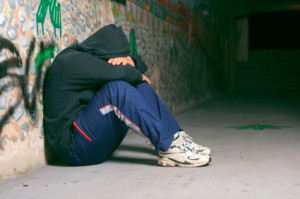- Calls to this hotline are currently being directed to Within Health, Fay or Eating Disorder Solutions
- Representatives are standing by 24/7 to help answer your questions
- All calls are confidential and HIPAA compliant
- There is no obligation or cost to call
- Eating Disorder Hope does not receive any commissions or fees dependent upon which provider you select
- Additional treatment providers are located on our directory or samhsa.gov
When Social Anxiety Keeps Your Family Member from Interacting with Others

Contributor: Crystal Karges, MS, RDN, IBCLC, Special Projects Coordinator at Eating Disorder Hope/Addiction Hope
Anxiety can take many different forms and can include anything from a specific phobia to generalized anxiety. Social anxiety is a type of anxiety disorder in which an individual fears interaction with other people that may incur feelings of inferiority, humiliation, embarrassment, depression and more. Because of these fears associated with interacting with other people, a person experiencing social anxiety will generally avoid social situations and tend to isolate.
While social anxiety can range in severity, many of the individuals who struggle with this form of anxiety will often experience a myriad of psychological, emotional, and mental symptoms as a result.
Social Anxiety and Avoidance Behaviors
Perhaps the most defining feature of social anxiety is the constant experience of intense anxiety when around other people and in social settings that does not subside, except when alone once again. For this reason, many individuals who struggle with this disorder will engage in avoidance behaviors as a means of controlling and/or preventing symptoms that result from this condition.
This can include anything from small family functions to large scale events; even every day common experiences, like eating in a restaurant, going to a class, or working out a the gym, or traveling. A person with social anxiety may find that their condition makes it virtually impossible to lead a normal life.
Support and Seeking Treatment
 If you have a family member who is struggling with social anxiety, you may find it difficult to understand their condition, their fears and uncertainties, and their method of coping with their anxiety. The best way to support your loved one is to validate what they are experiencing, listen without judgment, and encourage them towards professional help and treatment. Social anxiety often results from multiple and complex factors, and embracing a comprehensive approach to treatment can promote healing.
If you have a family member who is struggling with social anxiety, you may find it difficult to understand their condition, their fears and uncertainties, and their method of coping with their anxiety. The best way to support your loved one is to validate what they are experiencing, listen without judgment, and encourage them towards professional help and treatment. Social anxiety often results from multiple and complex factors, and embracing a comprehensive approach to treatment can promote healing.
It may be easy to disregard something like social anxiety as nothing more than extreme shyness, but this is a gross understatement of what a person is truly experiencing. Professional help is often needed to assist a person dealing with social anxiety towards living a normal life and may include psychotherapy and medication management.
You may be frustrated that your loved one is unable to engage with your immediate and extended family, but this is not deliberate. Be patient with your family member as they learn to navigate through their social anxiety and find the course towards healing and recovery.
Community Discussion – Share your thoughts here!
What coping mechanisms do you usually turn to, to relieve social anxiety? How would you recommend supporting others who struggle with this issue?
 About the Author: Crystal is a Masters-level Registered Dietitian Nutritionist (RDN) with a specialty focus in eating disorders, maternal/child health and wellness, and intuitive eating. Combining clinical experience with a love of social media and writing, Crystal serves as the Special Projects Coordinator for Eating Disorder Hope/Addiction Hope, where her passion to help others find recovery and healing is integrated into each part of her work.
About the Author: Crystal is a Masters-level Registered Dietitian Nutritionist (RDN) with a specialty focus in eating disorders, maternal/child health and wellness, and intuitive eating. Combining clinical experience with a love of social media and writing, Crystal serves as the Special Projects Coordinator for Eating Disorder Hope/Addiction Hope, where her passion to help others find recovery and healing is integrated into each part of her work.
As a Certified Intuitive Eating Counselor, Crystal has dedicated her career to helping others establish a healthy relationship with food and body through her work with EDH/AH and nutrition private practice.
The opinions and views of our guest contributors are shared to provide a broad perspective of eating disorders. These are not necessarily the views of Eating Disorder Hope, but an effort to offer discussion of various issues by different concerned individuals.
We at Eating Disorder Hope understand that eating disorders result from a combination of environmental and genetic factors. If you or a loved one are suffering from an eating disorder, please know that there is hope for you, and seek immediate professional help.
Last Updated & Reviewed By: Jacquelyn Ekern, MS, LPC on June 27, 2016
Published on EatingDisorderHope.com

The EatingDisorderHope.com editorial team comprises experienced writers, editors, and medical reviewers specializing in eating disorders, treatment, and mental and behavioral health.

